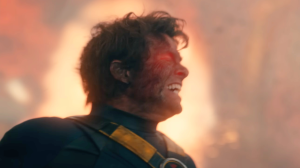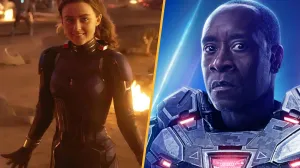More than 25 years after its initial release, Donkey Kong Country was recently made available on Nintendo Switch. As a result, a whole new generation of fans are discovering the Super Nintendo classic for the very first time. While the game’s platforming action made it an instant success back in 1994, the iconic soundtrack played an equally important role in the title’s popularity. Following the game’s debut on Nintendo Switch, ComicBook.com chatted with original composer David Wise about the legacy of Donkey Kong Country, Wise’s future with the franchise, and the game’s role in Super Nintendo’s success over the Sega Genesis.
Videos by ComicBook.com
Have you checked out Donkey Kong Country on Nintendo Switch? Are you a fan of the game’s soundtrack? Let us know in the comments or share your thoughts directly on Twitter at @Marcdachamp to talk all things gaming!
Keep reading to see what David Wise had to say about all things Donkey Kong Country!
25 years and still going strong!
ComicBook.com: Donkey Kong Country is now available on Nintendo Switch, and it seems like a lot of newcomers are discovering both the game and your soundtrack for the first time. How does that feel, more than 25 years later?
David Wise: Hello. Thank you for hosting me on your channel!
It’s good to know that DKC, along with my music, has longevity. 25 years is a long time. It’s amazing that so many people are still interested after all this time. And, that the game and soundtrack are still generating new fans after 25 years. Very humbling.
It’s also testament to Nintendo and how they see and develop games. After all, the Switch console lends itself perfectly to a game like DKC.
Naturally integrated compositions.
ComicBook.com: The music feels naturally integrated within the stages. At what point did the composition process begin in relation to the rest of the development process?
The music process was always invoked early on in the game design process at Rare Ltd.
A game somehow feels more developed with a dedicated music soundtrack. It helps to inspire creativity. It’s also an organic process, influencing gameplay, art, and character development during development.
Nintendo nurtures talent.
ComicBook.com: Was there any kind of guidance from Rare or Nintendo, or did you have a lot of freedom?
There is always welcome guidance from Nintendo. There is also a huge amount of freedom and creative expression. I have consistently found that Nintendo are very happy to let creativity breathe and flourish, especially for first drafts, and then possibly suggest changes or give ideas to reflect the development of the rest of the game.
Ambient sounds influence ambient music.
ComicBook.com: The music in Donkey Kong Country incorporates a lot of ambient sounds; those sounds really bring the world to life in a way that I don’t think we saw in a lot of games of that era. Do you feel like that set the stage for modern video game audio?
The SNES had several constraints for music creation. 64K of sample data memory and 8 monophonic channels. How the composer used those channels was therefore critical. Ideally, given more channels, we would have had dedicated channels for sound effects and dedicated channels for environmental sounds on top of the channels for music. So I composed the soundtracks to include environmental sounds.
Many of those environmental sounds were also rhythmic, so they helped drive the rhythm along too. Nothing was random, it was planned and integrated to make the best use of the resources we had available.
3D pre-rendered sprites.
ComicBook.com: Blake J. Harris’ Console Wars book credits Donkey Kong Country as a big part of the reason for the Super Nintendo’s success over the Sega Genesis. Was there ever a feeling during the creative process that you were involved in something big?
Rare had invested in some extremely expensive Silicon Graphics Computers, with a view to using these as a means to render sprites to give a pseudo 3D effect. Going back in time by 26 years, there simply wasn’t anything like this on a video game console. It was as though you could almost put your hand into the screen and pick the characters up. Even on the SNES, this was unprecedented territory.
I understood that I too was going to have to pull something out of the hat on a musical level. The opportunity to create something amazing was in front of the whole team. All we had to do was deliver.
No midi for the SNES.
ComicBook.com: There’s a real fan following that specifically surrounds your music from the Donkey Kong Country series. What do you think makes those soundtracks so enduring?
As a composer for the NES, I was used to coding everything as HEX subroutines using an editor called Brief. Then, I’d assemble the data, wait, edit the code and repeat, possibly hundreds of times per tune.
Data memory was at a premium. If we’d have used midi, this would have eaten into the available memory we could use. So I decided to code for the SNES. But this took a lot of time. Each tune would take at least 3 weeks to complete. I listened to the tunes on constant repeat over those 3 weeks.
I could have possibly left out some of the finer details. However, it would drive me crazy when I could hear a section I could improve upon, as I had no choice but to listen to it so very many times. Each part of the tune I could improve upon became a necessity for my own sanity. And it was probably this repeated attention to detail that helped shape the tunes on the SNES.
Personal favorites.
ComicBook.com: Is there a particular soundtrack that sticks out to you as a personal favorite?
Obviously Donkey Kong Country. I also enjoyed Starfox Adventures, Battletoads, and Snake Pass.
Wise remixed.
ComicBook.com: Several of the tracks that you’ve created for the series have gone on to receive remixes in other games. For instance, there’s an Aquatic Ambiance remix in Donkey Kong Country Returns, and a remix of Stickerbrush Symphony in Super Smash Bros. Ultimate. What’s it like hearing those songs evolve and remain an integral part of the character’s history?
It’s always very nice to hear remixes of work in other games. These tunes seem to have taken on a life of their own. That said, it’s also nice to know I was involved at their inception.
The future.
ComicBook.com: After an extended absence, you returned to the series with Donkey Kong Country: Tropical Freeze. Do you see yourself creating more music for the franchise in the future?
I’d obviously be delighted to be involved again if ever the opportunity were to come up in the future.
Why Compose for Video Games?
ComicBook.com: After all these years, you continue to create new music for video games, such as Snake Pass and Yooka-Laylee & the Impossible Lair. What is it about the medium that truly interests you as a composer?
I like the medium of video games. It feels like so much more than just another piece of music. It gives the vgm composer the chance to decorate and underpin the story in a very immersive way. And with larger scores, these themes can then be adapted creatively in so many different ways.
I still get excited when I hear my music in the game. The music sounds so much more cohesive when used in the intended environment and it really strengthens the whole experience and wonder of composing soundtracks specifically for video games.
*****
Donkey Kong Country is now available on Nintendo Switch, as well as Super Nintendo, Game Boy Color, Game Boy Advance, Wii, and Wii U. You can check out all of our previous coverage of the game right here.








